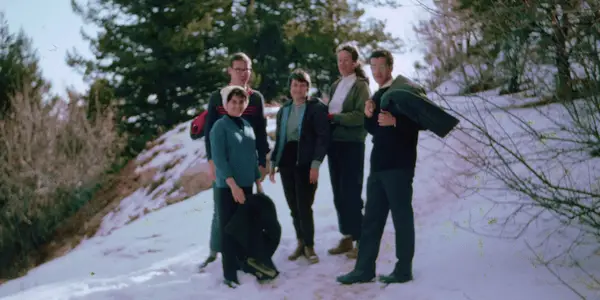One of the most unexpected joys I’ve had watching a documentary in recent years was when I viewed Nuria Giménez’s My Mexican Bretzel at the 2020 New York Film Festival, held virtually at the time because of the global pandemic. The documentary’s layered storytelling of a rich husband and wife and their deteriorating marriage played over archived footage from the camera of a wealthy couple. The lie at the center of the film isn’t really a twist or grand reveal but more the cards of the documentary’s inherent subjectivity and fiction laid bare. When we see real people we assume everything we’re told about them is real. But documentaries have cuts and pans just like every other movie. It’s a form that feigns having a grand truth in an inherently subjective and deceptive art. But that doesn’t mean that it can’t reveal deep and insightful things about the world. These two are not exclusive. Karim Aïnouz displays the act of inventing history and memories while still speaking to a truth about the world today in his wonderfully escapist film Mariner of the Mountains.
A Journey to Unexpected Place
In it, he centers on his mother Iracema, the key figure of inspiration for his trip to his home village of Tagmut Azuz in the Atlas Mountains in the region of Kabyle, which is about two hours from Algiers, the port he lands in. Iracema is not Algerian, she is Brazilian and that’s where she raised director Karim Aïnouz on her own while his father Majid was in Algeria fighting as part of the revolution against French occupation. Aïnouz’s visit to Algeria, a first for him, is a kaleidoscopic journey of not only interweaving narrative elements of family history, memory, and political crises, but an amalgamation of camera styles and formats. There is a strong sense of conscious affectation playing in the various movement and sounds in this film that deepens the meaning of what it portrays and what Aïnouz narrates over the images.

A combination of archival footage and photographs of his parents, microscopic film of aqua cell organisms in red seaweed, grainy aged celluloid of the sky, and lights both celestial and terrestrial, is spliced with 4K digital camerawork by cinematographer Juan Sarmiento G. The editing combines with carefully picked and memorably appropriate song recordings like The Beloved’s “Sweet Harmony” and “Inas I Yemma” by Amayas. The camera scans over faces and cuts go from modern-day to the Algerian war to outer space and into the sea. Ainouz never shies away from creating jarring juxtapositions. A dance sequence played to a collage of old grainy warm photographs stops mid-tune to a deadly silent and crystal clear 4K still shot of a cavernous road in an ancient village. Every time one may get comfortably set in the film’s rhythm, the rug is pulled out. The result of these choices is an adventurous mix of elemental textures that transport the viewer through history and space to unexpected outcomes.
The Stories We Tell Ourselves
The idea of truth and conjecture is a big theme in Mariner of the Mountains. As much as it is documentation and a recounting of family history, it’s also a guessing game and a tall tale. Aïnouz speculates in poetic fashion, the idealistic romances of his parents. The love letters they wrote to each other and the time they spent together in various places like Colorado and Algeria and Brazil are thought up by Aïnouz to paint a picture of a blossoming romance that survived beyond the Algerian War and beyond the oceans that eventually separated his parents. He ends this speculation abruptly by stating “I will never know what was in those letters. You burnt them all before you died.”
His own journey to Algeria is filled with interesting people he meets, including a man who is a doppelganger of himself with the same name. It’s a strange occurrence that is left to be ambiguously questioned, and Aïnouz purposefully blurs his narration and visual imagery to create certain deceptions. Like Giménez’s My Mexican Bretzel, the words, and the pictures may match up but leave doubt about their synchronicity.
Conclusion
Mariner of the Mountains is the sort of movie that not only surprises with its own originality but in turn inspires more original filmmaking. Aïnouz’s travelogue and montage approach is in its conception simple but is made so much more insightful through its visionary technical and formalist choices. Characters are always noticing the camera and the filmmaker head-on, there is a sense of direct contact with people that is displayed and ultimately tears down walls of alienation, othering, and unfamiliarity. As Amit Dutta declared in his documentation of an indigenous Warli village in Ramkhind, one’s position as a filmmaker is always intrusive, but Ainouz’s conversations and contextual referencing of people’s histories – concentrated on the Kabilye, a Berber ethnic group who speak their own language of Kabyle and write in the Tifinagh script (as opposed to Arabic for Algerian) – draw a distinct line from his father’s lineage. This journey to Algeria, a first for Aïnouz, reaches from the microcosm to the cosmos beyond and this ambition of the whole applied to its rather simple parts makes it an impressive feat.
Have you seen Mariner of the Mountains? What did you think? Let us know in the comments below!
Mariner of the Mountains was released for streaming on MUBI on May 23rd, 2022.
Watch Mariner of the Mountains
Does content like this matter to you?
Become a Member and support film journalism. Unlock access to all of Film Inquiry`s great articles. Join a community of like-minded readers who are passionate about cinema - get access to our private members Network, give back to independent filmmakers, and more.